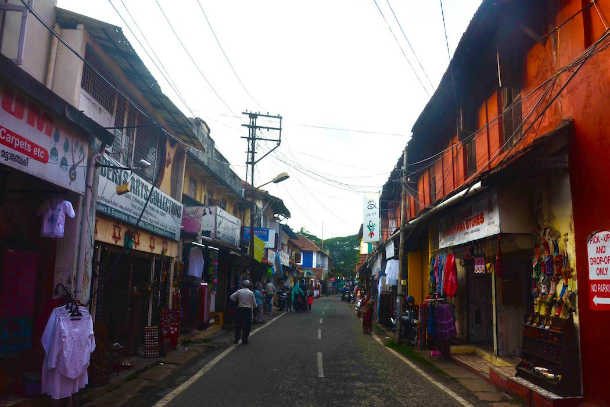
Narrow Synagogue Lane leads to the only functioning synagogue left in southern India's Kerala state amid a declining Jewish population. (Photo by Thomas Christopher/ucanews.com)
As the May sun fades, tourists in Kochi in the southern Indian state of Kerala are braving the high humidity while buying souvenirs of the nation's oldest Jewish settlement.
Synagogue Lane, 220 meters long, is dotted with historic homes that have been converted into shops, hotels and cafes.
Splintered doors with peeling paint would have tales to tell if only they could talk. One bright, candy green door stands out from the mostly pale buildings around it. And there is a modest metal plate with a sign reading "Sarah’s hand embroidery."
Inside the house is 96-year-old Sarah Cohen, the oldest living Jew in Kochi's district of Mattancherry.
Jews arrived in the ancient port town of Kochi some 800 years ago. With just three Jews left in Mattancherry — all of whom are aged more than 80 — Jewish life in Synagogue Lane is destined to disappear.
Once there was a vibrant Jewish community boasting astute business families.
At the dead-end of Synagogue Lane stands Kerala's only functioning synagogue. The caretaker of the 450-year-old place of worship, K.J. Joy, says it has not had regular prayer services for more than a decade because a quorum of at least 10 adult males is required.
Joy lamented that for the first time prayers were not even conducted at the synagogue for April's festival of the Passover marking Jewish liberation from slavery in ancient Egypt.
However, he told ucanews.com that a rabbi was made available for most feast days, particularly those held in September and October such as Rosh Hashanah, Yom Kippur, Sukkot and Simchat Torah.
Such occasions are joined by other Jewish people living in the surrounding Ernakulam region of more than 3,000 square kilometers, which had eight active synagogues a century ago.
"Now, we are altogether just 25, including the three in Mattancherry," says Joseph Elias, who has become de facto spokesperson for Kerala Jews.
Elias takes care of a now non-active synagogue inside the busy Ernakulam market area.
Jews once controlled much of Kerala's trade, particularly of pepper and other spices as well as coir, a material extracted from coconut husks used to make doormats, brushes and mattresses.
Twelfth century Jewish traveler Benjamin Tudela wrote of several thousands of "Israelites" in the Kerala coastal town of Kollam. And Jewish settlements developed in other towns such as Kottayam and Calicut.
Elias said erosion of the various Jewish settlements began with members of the younger generation marrying non-Jews and also from conversions to Christianity.
Demographic decline accelerated markedly with mass migration in the wake of Israel being established in 1948. Another factor was uncertainty and communal tensions linked to India's 1947 independence from British colonial rule.
Members of the southern Indian community were known as Cochin Jews, or Kochinim, because their forebears settled in the former Kingdom of Cochin. They were also referred to as Malabari Jews denoting the Malabar Coast.
Over the years, they assimilated, adopting the local language and much of the culture, to the extent that many came to be referred to as "black Jews."
But the trend of migration continued until almost all had left southern India, Elias said, adding that he also plans to move to Israel even though he loves Kerala as his place of birth.
The Sephardi Jews at Mattancherry, with 16th century Spanish historic roots on the Catholic Iberian Peninsula, are often further categorized as Paradesi, or foreigner Jews. Their knowledge of European languages helped them to trade with Europe and to maintain an identity distinct from the so-called black Jews.
Changing Synagogue Lane
The only Jew available to meet visitors in the Synagogue Lane now is Sarah Cohen.
Over the past decade, Cohen has become something of a living monument representing Mattancherry or Paradeshi Jews, because two others in the Lane do not wish to talk to visitors.
But unfortunately, she is frail and can no longer speak coherently. Cohen spends most of her days in an easy chair, occasionally opening her eyes to look at the lane through a window.
"Thaha, Thaha, Thaha…" she mutters as if she wants to tell something to her long-time helper and caretaker, Thaha Ibrahim.
"I feel sorry that destiny wants me to witness the end of an era," said the 48-year-Muslim man, who began to work for the Cohen family at the age of 12.
When Ibrahim joined the childless Cohen family all those years ago, he said they had already decided not to migrate to Israel.
After husband Jacob Cohen died a decade ago, Ibrahim was the only one to help look after the elderly lady. Until last year, she spoke clearly, but now her health is deteriorating, he said.
Although Cohen's memory is weak, Ibrahim makes sure that she is able to eat kosher food, just as she did when she was still able to cook.
"We order kosher meat from Mumbai," Ibrahim said of the major city formerly known as Bombay. "God is the judge."
Amid flashes of memory, Cohen sometimes calls out names in attempts to communicate with the shadows of people passing in the street, many of them shopkeeper migrants from northern Kashmir.
Some of the cloth and other items on sale are falsely claimed to have come from the state's depleted Jewish community.
Cohen's twilight reflects the wider fate of Kerala's Jews: isolated now and lacking the ability to give voice to a rich past. She too is weathered and worn like the doors that were once opened and closed by members of a unique outpost of the Jewish diaspora.


